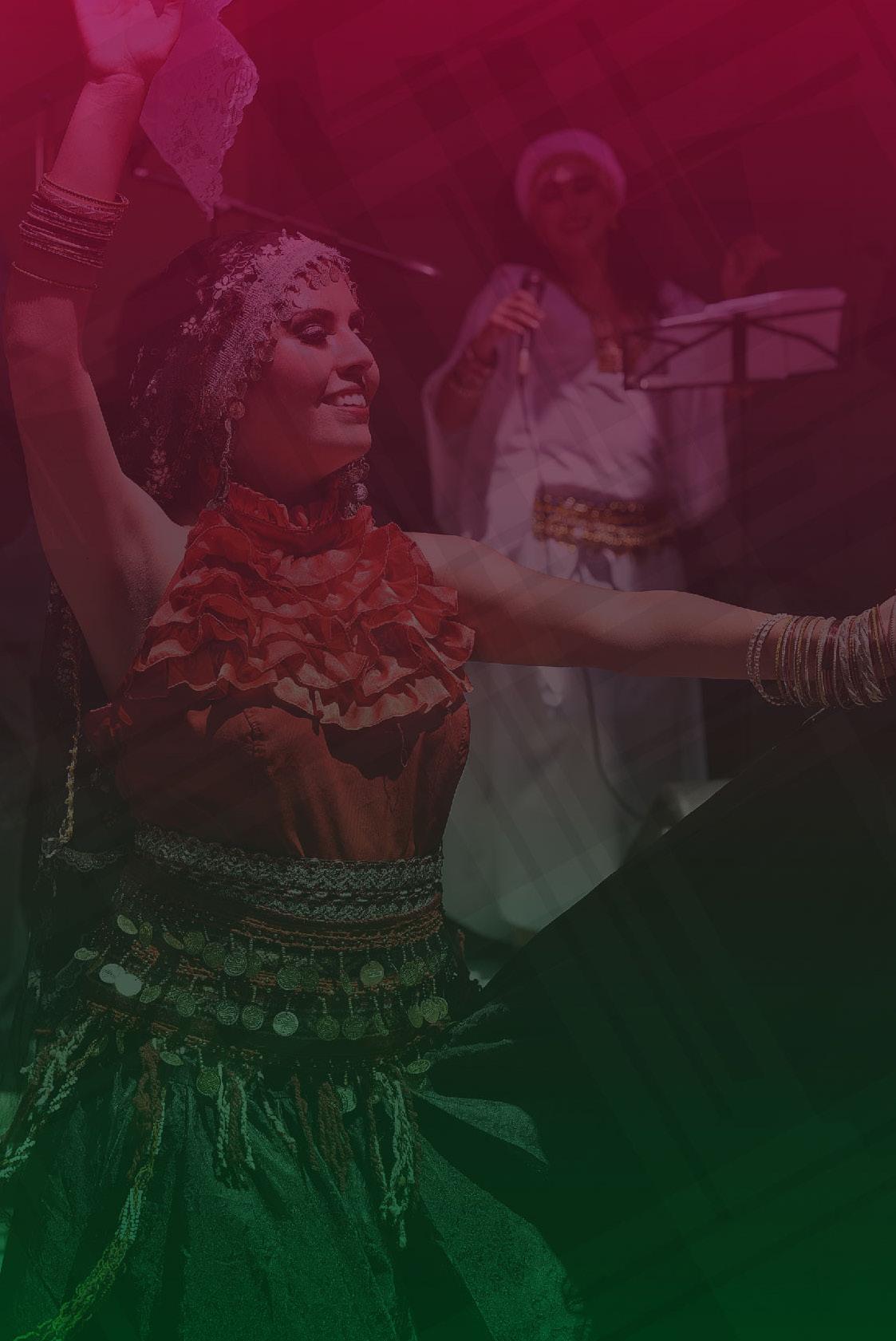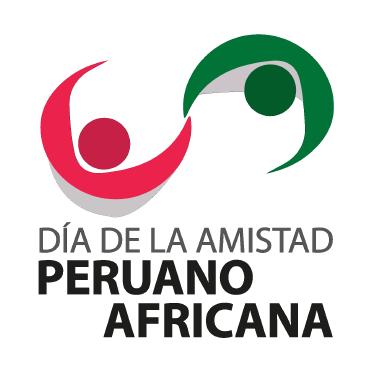
ABUJA NATIONAL MOSQUE


ABUJA NATIONAL MOSQUE
VIRTUAL BULLETIN OF PERUVIAN CULTURE FOR AFRICA
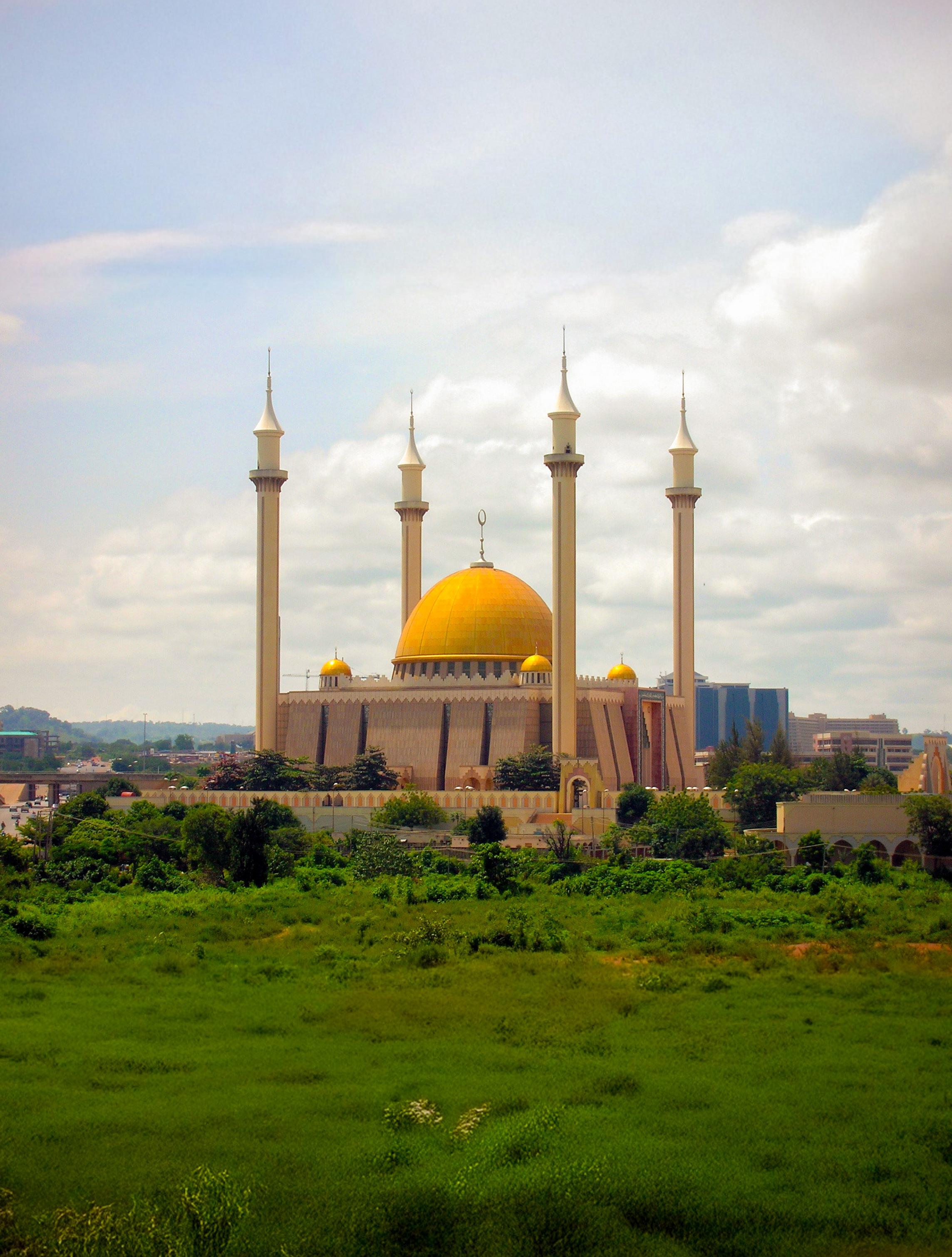
NIGERIA: CULTURE, INFLUENCE AND LINKS WITH PERU
ATTIÉKÉ WITH FISH STEW PERU IN ECOWAS
Jonathan Quevedo tello third Secretary in the diplomatic Service of the republic of peru
"Let me make a solemn pledge before all of you, before the whole world and before God, that I will devote all my energy and all I possess in my power to serve the people of Nigeria and humanity".

In recent years, the international landscape has undergone major transformations as a result of various changes and processes that, through their convergence or divergence, have reconfigured the global panorama. The post-COVID-19 pandemic era, emerging trade tensions, latent and active conflicts in different global scenarios, the emergence of artificial intelligence and the technological race between great powers present a new set of challenges that need to be addressed by the international community and, in particular, by the countries of the Global South.
In this context, there is a need to forge new strategic alliances and regional approaches within the Global South, a region marked by its diversity of contexts and actors whose international relevance increases
over time. It is in this context that Peru, as part of its strategic positioning strategy, views the African continent with interest, recognizing in particular theest African region as a priority area for strengthening its bilateral and multilateral relations.
From these premises, Nigeria emerges as a fundamental partner. With a population of more than 220 million inhabitants, a diversified economy and a notable cultural influence, the country is positioned as a regional power and a key ally for Peru's greater insertion in West Africa. In this region, the Economic Community of West African States (ECOWAS) plays a key role as a political, economic and security integration bloc, which Peru observes with growing interest.
Created in 1975 by the Treaty of Lagos, ECOWAS currently groups together the vast majority of subSaharan West African countries. Its main purpose is to promote regional economic integration, with a view to the creation of a common market, the free movement of people, goods and services, and the development of common policies in areas such as agriculture, energy, education and security (ECOWAS, 2023).
ECOWAS represents one of the most attractive and dynamic communities on the African continent, with potential for commercial promotion and expansion for Peru, being an attractive market with around 400 million inhabitants, abundance of strategic natural resources and a growing urban middle class. It also stands out for its demographic and cultural dynamism, with young, expanding societies and a strong presence in the digital world.
Despite the challenges this region presents, ECOWAS has demonstrated great resilience and cohesion, especially in defence of values such as multilateralism and democracy. Its interventions for the resolution of political crises, such as in Gambia (2017), its permanent willingness to facilitate the democratic transition in some of its former members such as Burkina Faso, Mali and Niger, its constant electoral observation missions to ensure fair and transparent
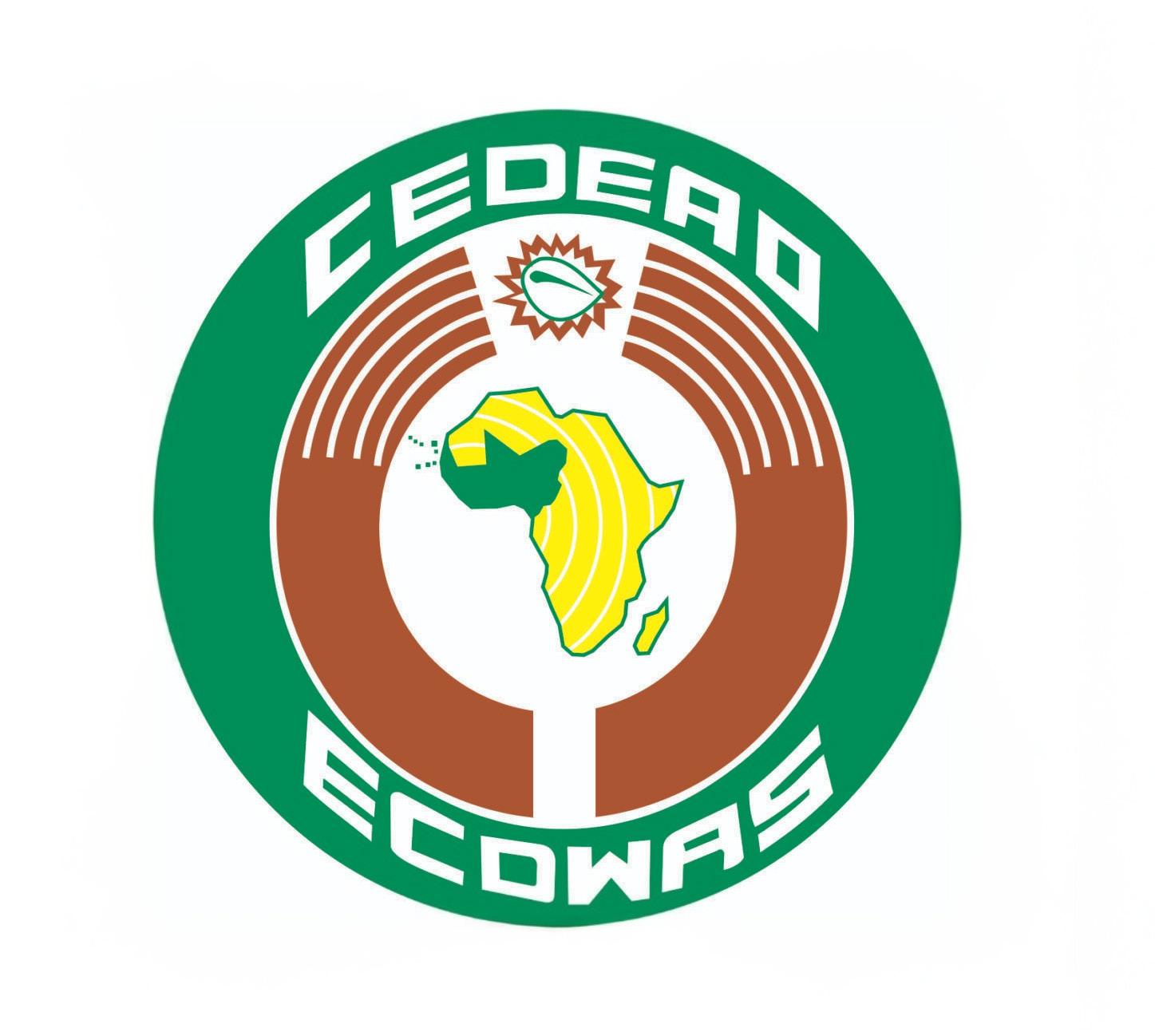
Source:
elections, as well as its financial and energy integration initiatives, reflect its role as a key player in the contemporary African landscape (Adebajo, 2020).
For all these considerations, Peru aspires to be an observer State of ECOWAS, in order to build bridges between our country and the African continent, as well as strengthen Peru's diplomatic, commercial and cultural presence in West Africa..
With around 250 million inhabitants, Nigeria is the most populated country on the African continent and is one of the most diversified economies on the continent which includes not only hydrocarbons sector, but also telecommunications, financial services, agriculture, technology and creative industries. For example, the city of Lagos is considered the cultural capital of English-speaking Africa, thanks to the rise of film ("Nollywood"), music ("afrobeats") and fashion.
The commercial sphere offers fertile ground for opportunities for strengthening the bilateral relationship. There are a lot of opportunities for growth and diversification with products such as cocoa, coffee, fish, pharmaceuticals, fertilizers and
light manufacturing that could find markets in both countries. Similarly, Peruvian experience in sustainable mining, industrial fishing, and agribusiness could be adapted to the needs and priorities of the Nigerian market (MINCETUR, 2023).
On the other hand, due to its condition as a coastal country, it hosts one of the most important ports in West Africa: the Port of Apapa in Lagos. Closer ties between Peru and Nigeria could enhance the entry of Peruvian products into that region, mainly through strategic alignment and connection with Peruvian ports such as the Chancay Megaport.
Nigeria also represents significant potential for establishing academic relations between Peruvian and Nigerian universities, such as the University of Ibadan or the University of Lagos, with special emphasis on areas such as social sciences, agriculture, tropical medicine and Afro-descendant studies. Likewise, Nigeria could also benefit from Peru's experience in poverty reduction, community health or natural disaster risk management programmes.
In the cultural aspect, it is pertinent to note that in Peru, the Afro-descendant heritage is present in music, dance, gastronomy and religious iconography. Strengthening cultural ties with Nigeria would allow the reinterpreting the Afro-Peruvian heritage, generate spaces for intercultural dialogue and foster pride in a mestizo and plural identity. Activities such as dance festivals, joint gastronomic exhibitions and Afro-descendant art exhibitions can open new paths of understanding and collaboration.
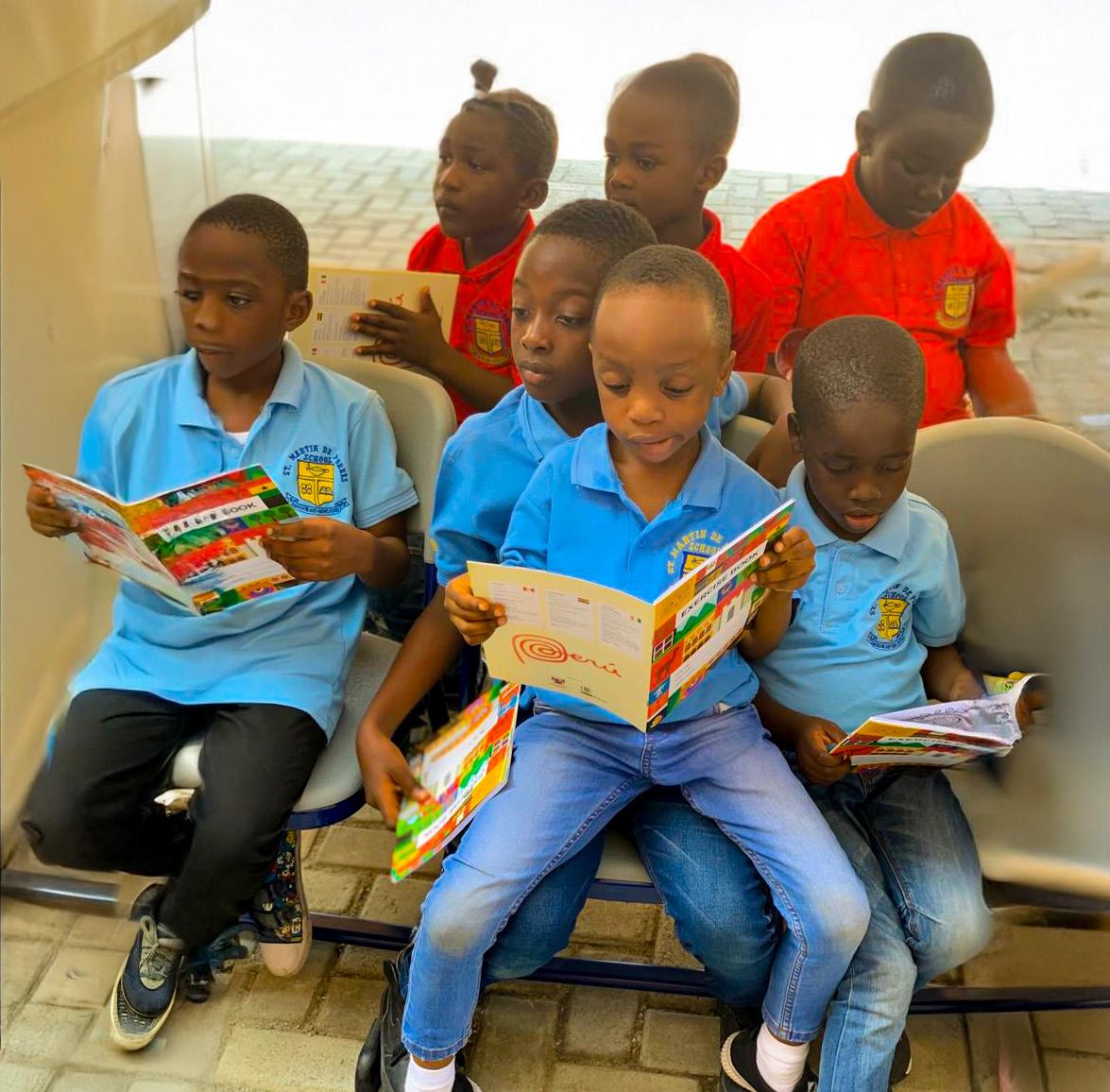
Since the opening of its Embassy in Accra, Ghana, in 2014, Peru has been consolidating its diplomatic, strategic and active presence and influence. Ghana, as an active member and promoter of ECOWAS and as an example and beacon of democracy in the region since the establishment of the Fourth Republic, has become a point of articulation for relations between Peru and other West African countries. From Accra, cultural activities, business meetings, academic events and participation in both African and global multilateral forums have been developed.
Within the framework of this deployment, cultural diplomacy has played a fundamental role. The screening of Peruvian films at film festivals, presentations of Afro-Peruvian dances and tastings of Peruvian food have allowed Peru to be shown as a diverse, modern nation deeply rooted in its Afrodescendant history.
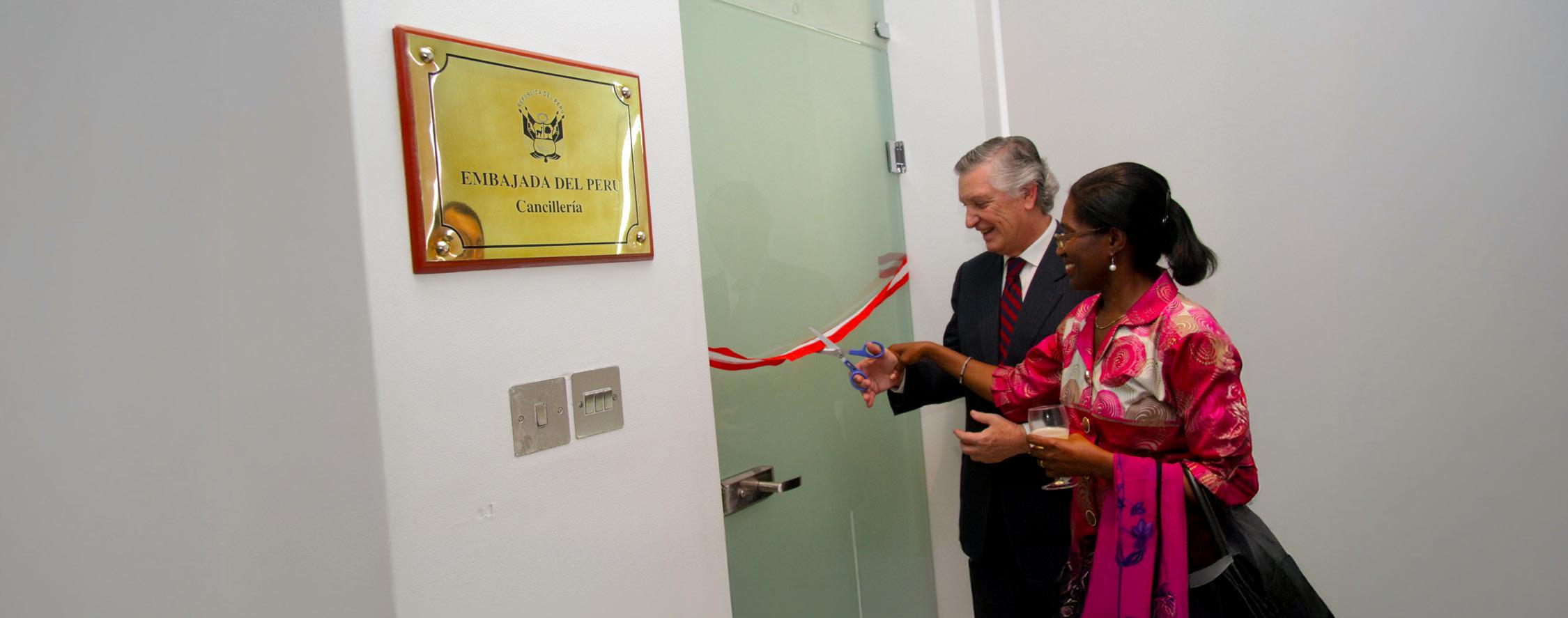
An approach that revalues Africa's contribution to Peruvian identity can strengthen bridges of empathy and cooperation. Art, literature and music, as universal expressions, become effective instruments for bringing people together.
Likewise, Peru could play an articulating role between West Africa and the Pacific Alliance, taking advantage of its membership of this Latin American bloc to promote bi-regional dialogue platforms. This type of diplomacy would allow Peru to position itself as a country with the capacity to connect two geographically distant but complementary regions.
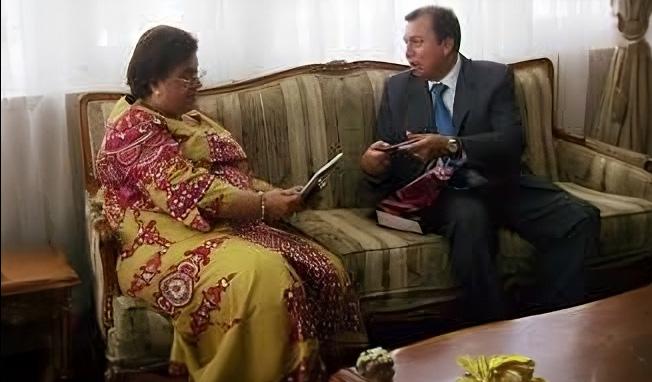
West Africa and Latin America share a strong tradition of building regional integration mechanisms with a view to strengthening multilateral relations within the continent. Both ECOWAS and the Andean Community (CAN), the Pacific Alliance, among others, share objectives of economic integration, people mobility, security cooperation and sustainable development.
Likewise, large regional spaces such as the Community of Latin American and Caribbean States (CELAC) and the African Union also pursue these objectives at the continental level, seeking to improve the quality of life of their citizens.
In this sense, it would be important to promote rapprochement between both regions in order to strengthen dialogues and facilitate understandings,
to better address global challenges. Among the tools that could contribute to this purpose stands out the possible creation of bi-regional forums between ECOWAS and Latin America, the promotion of triangular technical cooperation programs with the participation of international organizations, the establishment of decentralized alliances between regions and cities, as well as the formation of shared research networks, among others.
These proposals would allow the consolidation of a more horizontal relationship, based on solidarity, the exchange of knowledge and the construction of common solutions to shared challenges. Creating these platforms would be an interesting niche for Peru, expanding and diversifying its diplomatic work and, therefore, its influence.
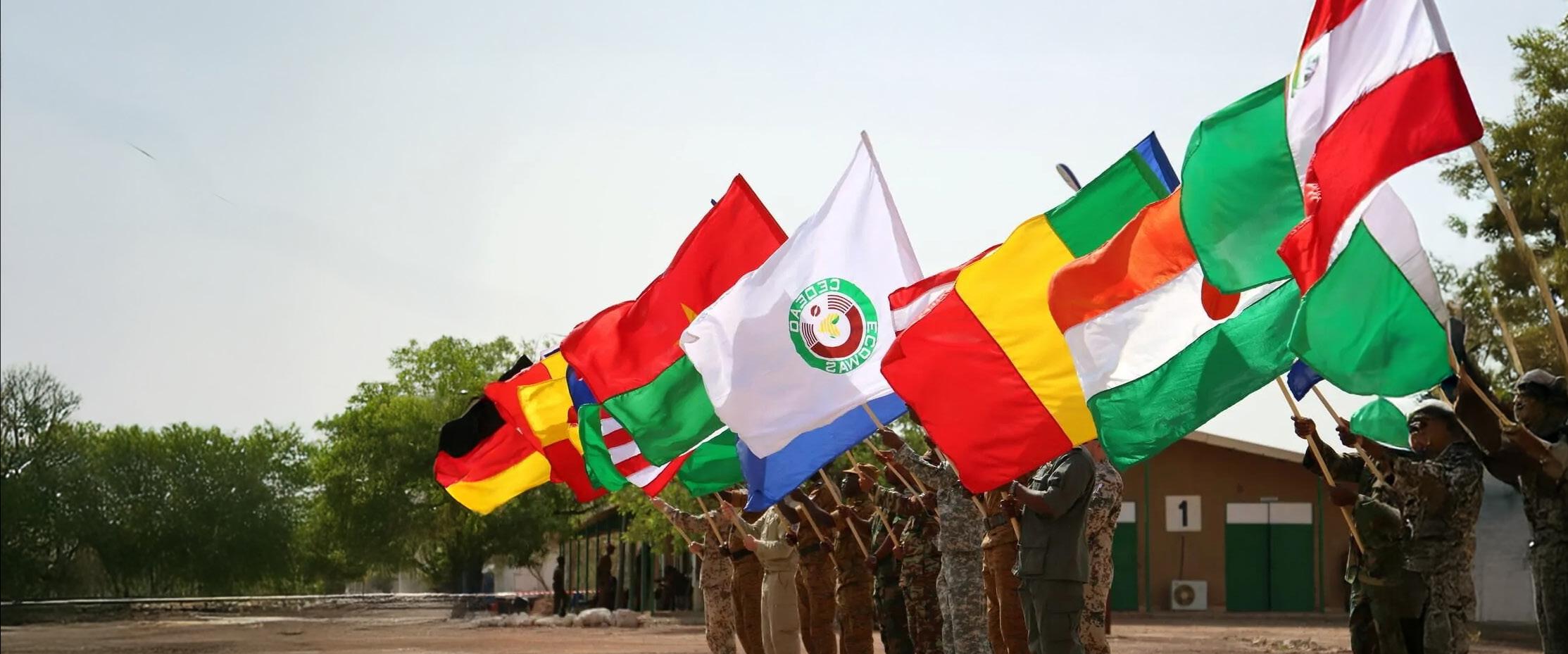
The range of opportunities offered by Nigeria and West Africa would strengthen Peru's presence in the region and allow for greater rapprochement and understanding between our country and the African continent. In this regard, the Ministry of Foreign Affairs could take concrete actions to promote these rapprochements, in accordance with the Strategic Plan of the Ministry of Foreign Affairs for Africa 2024-2030, promoted by the General Directorate for Africa, the Middle East and Gulf Countries.
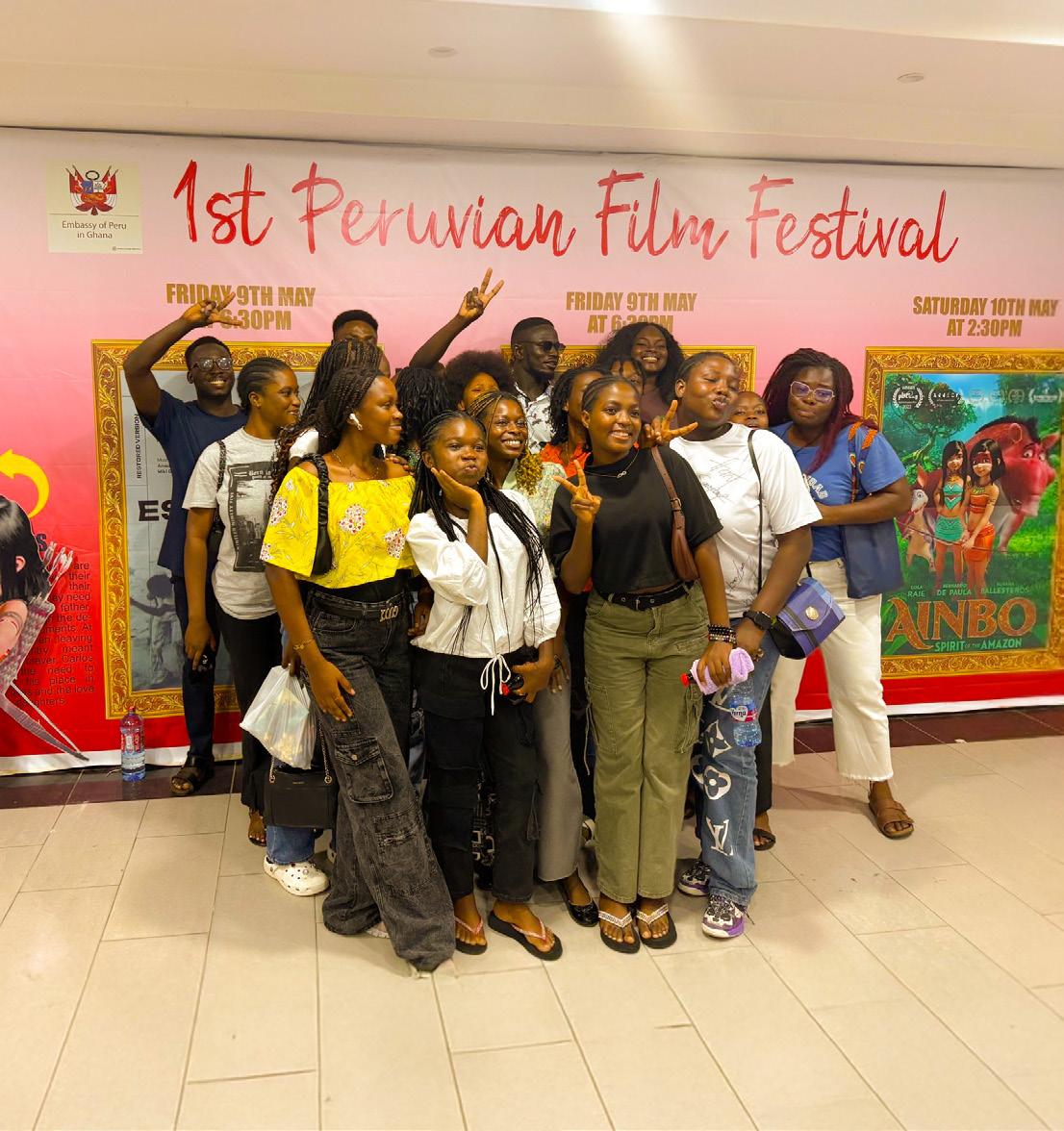
The first of these actions would be the expansion of Peru's diplomatic presence in West Africa, strategically, through the strengthening of the Peruvian Embassy in Ghana and the establishment of concurrent accreditations with countries such as Nigeria, Côte d'Ivoire and Cameroon. Similarly, consideration could be given to the eventual opening of an Embassy in Abuja, Nigeria, particularly relevant as it is the seat of ECOWAS.
To strengthen bilateral relations, Peru will seek the deployment of reciprocity in terms of diplomatic presence. For the case of West Africa, the opening of a Ghanaian Embassy based in Lima will be proposed, with Peru as a privileged partner in the Pacific.
In the area of trade and investment, Peru will seek rapprochement between the commercial and business communities of both countries to promote and increase commercial and investment exchange. Important tools for this are the Trade and Investment Promotion Seminars. For the case of West Africa, this year the II Seminar of this type will be held in Accra, Ghana.
Regarding cultural exchange, strengthening Peru's cultural diplomacy with a strong Afro-Peruvian component is crucial. In this sense, photographic exhibitions such as “Es Amador” facilitate the approach of Peru’s Afro-descendant legacy with African cultural heritage.
On the other hand, cultural events such as film festivals allow Peruvian culture and its history to be disseminated through the stories told by these films. Notable examples are the films “Deliciosa Fruta Seca” and “Ainbo: Espíritu del Amazonas”.
In the same vein, activities linked to Afro-Peruvian dance and music, especially with the presence of traditional African leaders, allow cultural similarities in rhythms and movements to be identified, recognising the undeniable parallelism between both cultures. In the case of Ghana, the appreciation made by the Dzasetse Nii Amarkai III of the Ga people was notable within the framework of the I Seminar of Peruvian Music and Dance in Accra, when he pointed out that "there are no differences between Ghana and Peru, they are the same", in reference to the similarities of our celebration and traditional Ghanaian dances.
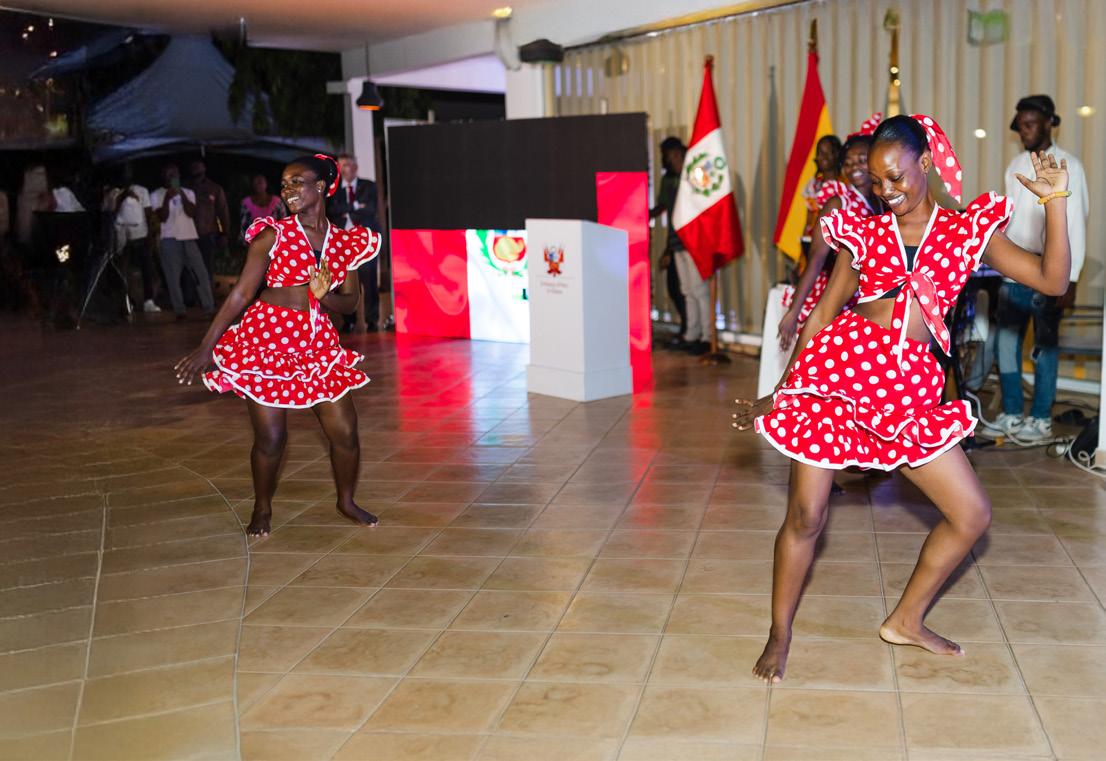
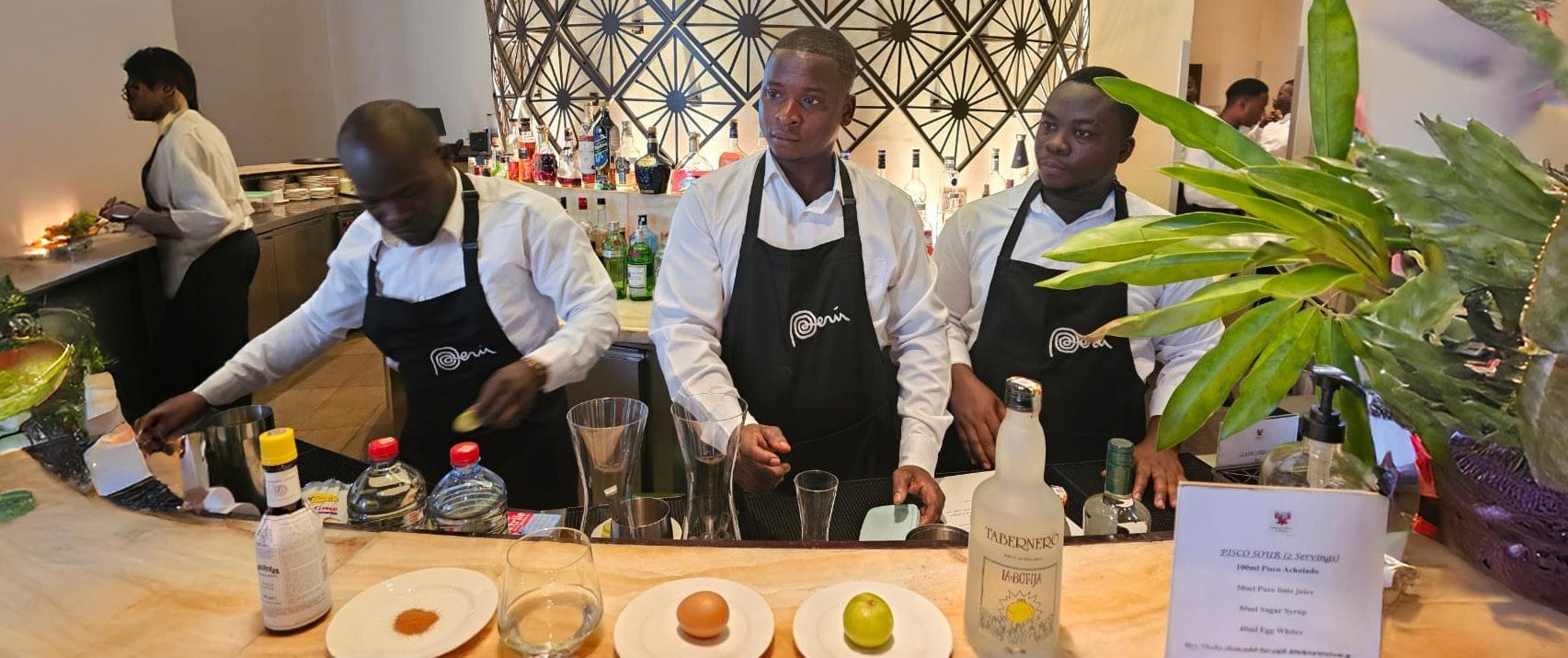
In the field of gastronomy and spirits, the potential for expansion of our gastronomy and pisco is immense. In African cuisine, specifically Ghanaian, it is possible to observe the traces and origins of many traditional dishes of Peruvian gastronomy, based on the existing similarities, for example, between "waakye" and "tacu-tacu", which opens culinary opportunities yet to be explored.
On the other hand, the African continent is a promised land for our pisco and pisco sour, with enormous expansion potential. Activities to promote the consumption of our flagship drink, such as master
classes in the preparation of pisco sours, provide the opportunity not only to facilitate the expansion of our most representative cocktail, but also to present its history and its undeniable Peruvianness. In the case of Ghana, the master class in pisco sour preparation held in November 2024 has borne concrete fruit; currently, four establishments serve our flagship cocktail, one wine shop distributes our pisco and two other establishments are scheduled to incorporate it into their offering soon.
The strengthening of ties between Peru and West Africa represents not only an economic opportunity, but also a commitment to diversity, intercultural dialogue and the construction of a more equitable international order. In this process, Nigeria and ECOWAS appear as strategic allies who share common challenges and convergent aspirations with Peru.
From a diplomatic perspective, the challenge consists of overcoming geographical, linguistic and historical barriers, and building relationships founded on mutual respect, horizontal cooperation and recognition of shared identities. From a cultural perspective, the reunion with West Africa allows Peru to reinterpret its Afro-descendant heritage, value it as an integral part of its national identity and project it as a bridge to the future.
The Peruvian Foreign Ministry, through its diplomatic network and its commitment to cultural diplomacy,
can play a leading role in this process, promoting a new South-South narrative in which Peru is recognized as a relevant actor in Africa, and Africa as a key region in Peruvian foreign policy in the 21st century.
Adebajo, A. (2020). The Curse of Berlin: Africa After the Cold War. Oxford University Press.
Economic Community of West African States (ECOWAS). (2023). About ECOWAS. Retrieved from https://www.ecowas.int/
Ministerio de Comercio Exterior y Turismo del Perú (MINCETUR). (2023). Mapa de oportunidades comerciales para África. Dirección General de Promoción de Exportaciones.
abel cárdenaS tuppia miniSter counSelor in the diplomatic Service of the republic of peru
The Federal Republic of Nigeria, located in West Africa, has great influence on that continent due to its economic, demographic and cultural weight. With more than 220 million inhabitants, it is the most populated country in Africa and the sixth most populated in the world, as well as one of the political and economic engines of the region.
However, Nigeria's richness goes far beyond demographics or statistics: Nigeria is a vibrant nation, with a unique cultural diversity and a growing international presence.
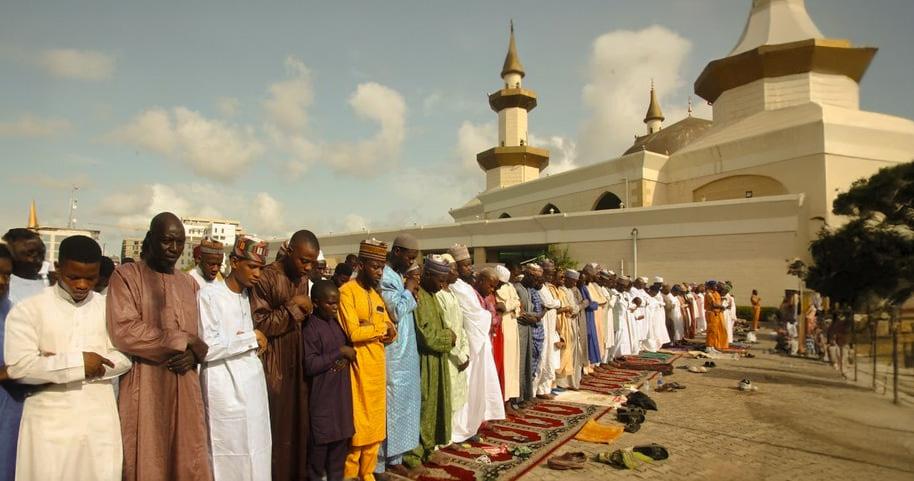
Nigeria has one of the richest and most diverse cultures on the African continent. It has more than 250 ethnic groups and languages, making it one of the continent’s richest cultural mosaics. The three largest groups—Hausa, Igbo, and Yoruba— bring unique belief systems, gastronomy, dances, literature, and music, which are increasingly known globally.
Surely the reader will have heard of Nollywood or will
have had the opportunity to see a film produced by this great Nigerian film industry, which ranks among the largest film industries in the world. It emerged with the oil boom and has become the second largest in the world, surpassing Hollywood and behind Bollywood, with more than 7000 titles in 13 years. Nollywood has generated an important cultural impact throughout the African continent and has been internationalized through the African diaspora in the world.
Similarly, in musical terms, Nigeria has been called "the heart of African music". Genres such as highlife (Ghana and Sierra Leone) and palm-wine or maringa (Sierra Leone), which fuses native rhythms with imported techniques, have served as the basis for the development of several popular genres in Nigeria, such as apala, fuji, jùjú and yo-pop. Likewise, Nigerian musicians developed local genres influenced by American hip hop culture, highlighting hiplife (Nigerian hip hop) and Jamaican reggae (Nigerian reggae). Also, we should mention that genres such as afrobeat have influenced artists from all over the world, which puts Nigeria more and more in the artistic arena of the world.
Of course, a society is difficult to comprehend if we do not consider its religious foundations. In Nigeria, 99.69% of the population declares itself a believer. The main religion is Islam (50.8%), practiced mainly in the north, and Christianity (42%), predominant in the south. In addition, there is a significant minority who practice traditional African religions, often in syncretic ways with Islam or Christianity. It should also be noted that Muslim and Christian religious practices in that country have a large presence of syncretic elements of traditional religions, such as Yoruba, and the identification of their deities known as Orishas with religious figures from Islam or Christianity.

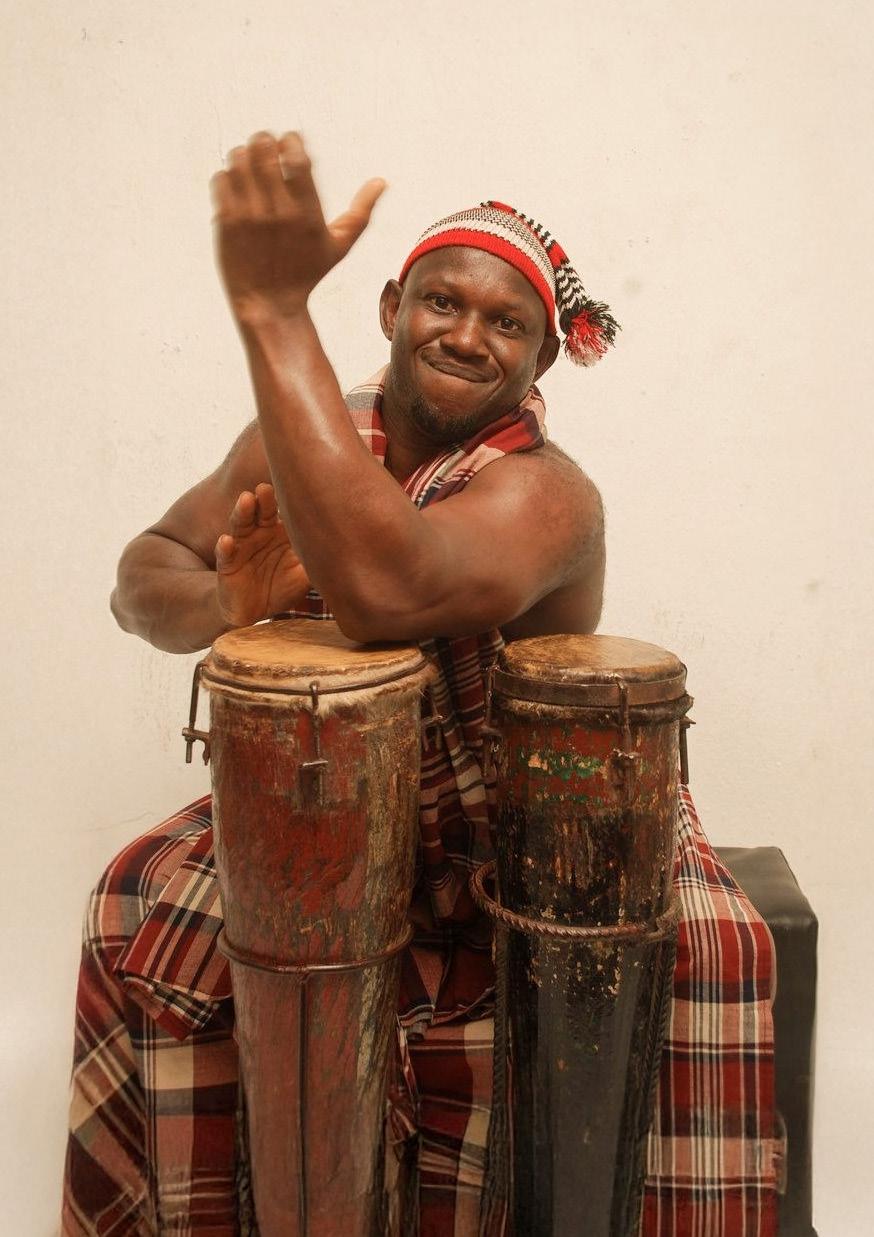
To better understand what we mean when we talk about traditional religions (also called tribal), we must consider that in them there is a "mythical world" (spiritual realm), different from the sensory one, which is not altered by time and shares the physical space, in a parallel way. It is a space full of legendary and/or divine figures who created or established the acts that make up daily life (such as hunting, gathering, waging war, or expressing love).
Another important aspect for understanding the collective imagination in this part of the world is the notion of time that African people handle. It is neither linear nor circular in conception, but an "eternal now", centred more on a causal sequence than a chronological one, since the past implies a return to the original source. In this sense, they usually divide human beings by their proximity to the source, thus, the first to have been created have pre-eminence over the last, which is why these peoples have great respect for their elders.
Nigeria is considered the "giant of Africa", as it is one of the largest economies on that continent, thanks to its vast oil and gas reserves and a rapidly growing tech sector. It is also a key actor in the African Union and in regional organizations such as ECOWAS (Economic Community of West African States).
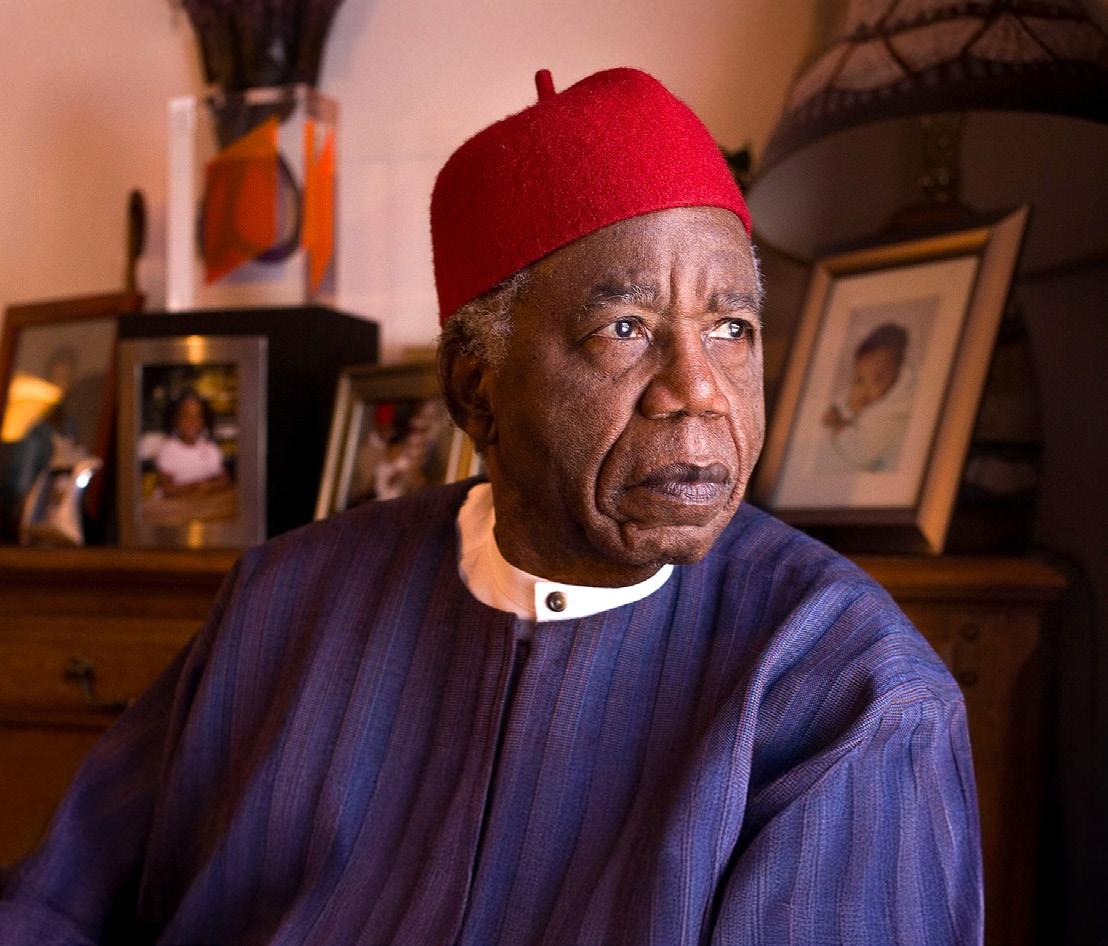
Source: bard.edu
Although geographically distant, Nigeria and Peru have developed diplomatic and trade relations. Bilateral relations with Nigeria began in 1971, via an exchange of diplomatic notes and, since then, they have been increasing steadily over time.
In recent years, there has been a renewed interest in strengthening ties between our two countries, through cultural exchanges, South-South cooperation, and commercial opportunities.
In the cultural field, the study of African roots in Peru, particularly on the Peruvian coast, has led to a renewed interest in African cultures, including Nigerian. In this sense, Nigeria represents a key point for understanding the legacy of the African diaspora in Latin America.
Furthermore, Peru sees in Nigeria a strategic market within Africa for the export of agricultural, pharmaceutical and service products, whilst Nigeria
In addition, it has become a centre of African intellectual thought, with figures such as Chinua Achebe (author of Things Fall Apart) and Wole Soyinka, the first African to win the Nobel Prize for Literature.
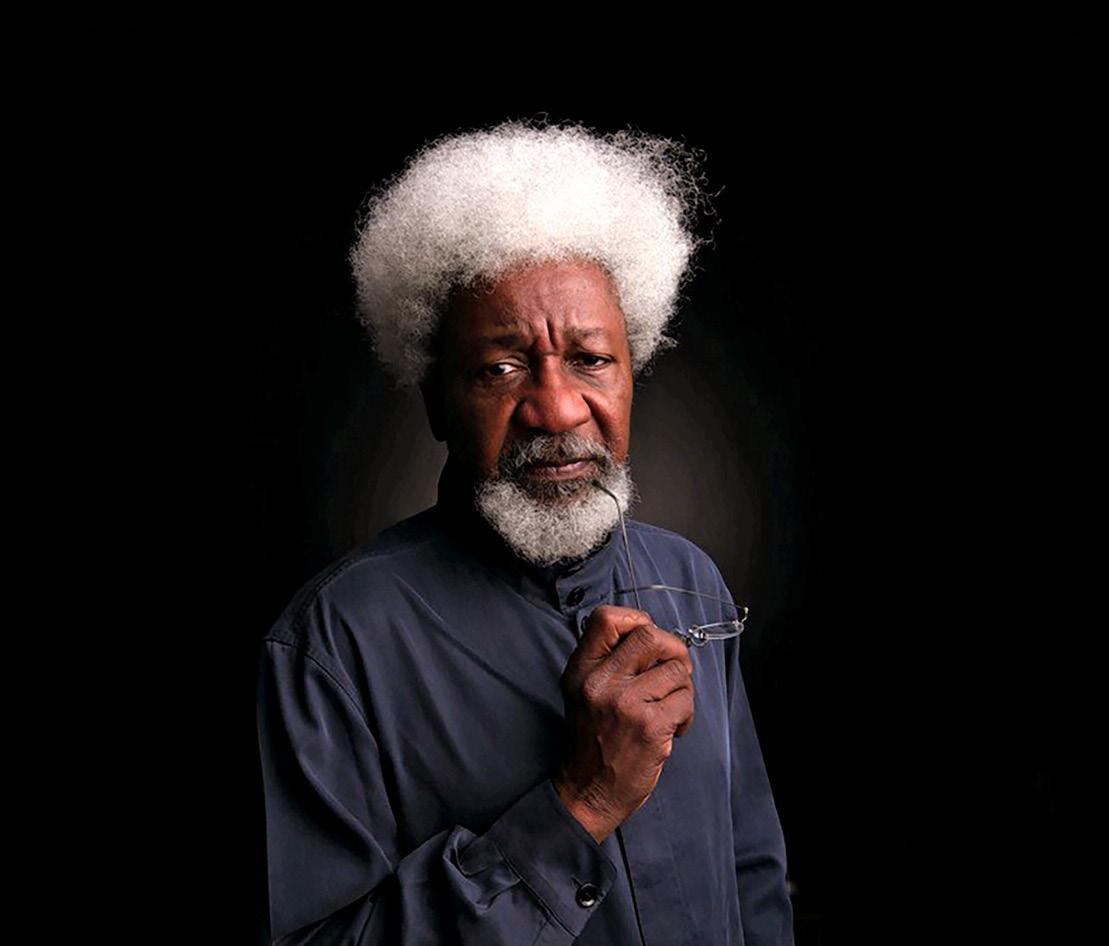
is interested in Peruvian knowledge about fishing, high-altitude agriculture and gastronomy.
Nigeria is not merely another African country: it is a cultural, economic and political powerhouse which embodies the continent’s resilience and diversity. Its influence extends beyond its borders, reaching even Peru, with whom it shares interests in development, culture and cooperation. With the strengthening of these ties, both countries have much to gain, both in the bilateral sphere and in building a more solid South-South dialogue.
For all this to be possible, it is necessary that we try to better understand the cultural mindset of the Nigerian people, which goes beyond their traditions and culture, immersing ourselves in the spirit that animates them, that endows them with meaning and that constitutes the basis of their tastes and needs.


The protection of women's rights and their empowerment are top priorities on the international agenda. Various countries and international organisations actively promote initiatives aimed at improving women's living conditions, especially among women from vulnerable groups or communities. This concern becomes more relevant in regions of the Global South, where women often face greater structural and socioeconomic inequalities that limit their access to resources, services, and development opportunities.
In this context, women's economic empowerment strategies not only represent a response to these gaps but also serve as platforms for cooperation. Latin America and West Africa, diverse regions with common social problems, have made significant efforts to promote the role of women, especially in rural areas.
In West Africa, one of the most representative programmes in this line is the Business Incubator for African Women Entrepreneurs (BIAWE), promoted by the Economic Community of West African States (ECOWAS), in collaboration with the Spanish Agency for International Development Cooperation (AECID) and the New Partnership for Africa's Development (NEPAD).
Between 2018 and 2020, this project promoted the creation of business incubation centres in rural areas of Burkina Faso and Sierra Leone, which provided women with training in gender equality, access to markets, processing of local products such as cereals, cassava, fish, palm oil and poultry, as well as microcredits to support the development of small businesses. In contexts where families depend mostly on subsistence agriculture, the transition to agribusiness models was also encouraged (ECOWAS, 2018, 2020).
In 2024, ECOWAS complemented these actions with the creation of the Federation of Women Entrepreneurs (FEBWE) Business Fair, a platform for African women entrepreneurs to showcase their products and expand their commercial networks.
In the same year, in collaboration with Ecobank, the Women Traders Empowerment Programme was launched in Nigeria, offering business training, mentorship, and access to finance to 400 women traders, to prepare them to take advantage of the opportunities of the African Continental Free Trade Area (AfCFTA) and contribute to regional economic growth.
Source: hausa.libertytvradio.com
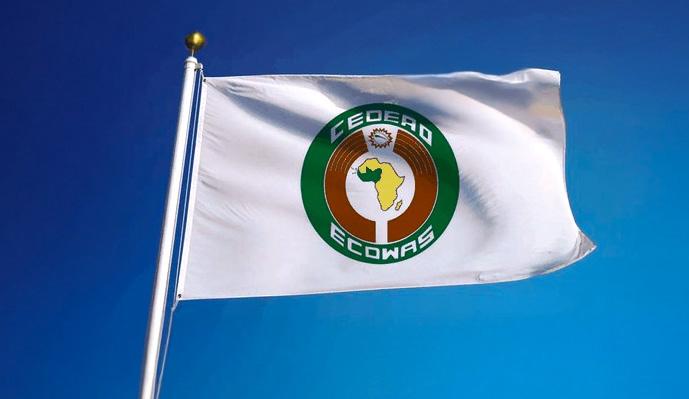
This initiative reflects ECOWAS's Vision 2025, which seeks to promote inclusive growth and sustainable development in the region. According to ECOWAS Commissioner for Economic Affairs and Agriculture, Ms. Massandjé Toure-Litse, these actions would be "a way of building bridges across the West African region in terms of empowerment by preparing women (...) and to develop their capacity, not only so that they are empowered socially, but also economically".
These African experiences find an interesting parallel in Peru, where the Ministry of Agrarian Development and Irrigation (MIDAGRI), through the Directorate for the Promotion of Women Agricultural Producers (DPMPA) and Agroideas has been promoting, since 2022, the Rural and Indigenous Women's Entrepreneurship Strategy (EEMRI), which provided support to rural and indigenous women's organizations through subsidies for entrepreneurship and economic empowerment plans (MIDAGRI, 2025). Within this framework, the EEMRI promotes enterprises in the agricultural, livestock (cattle farming) and forestry sectors, to increase women's incomes, strengthen their economic autonomy and reduce gender gaps in rural areas.
On the other hand, the Ministry of Women and Vulnerable Populations (MIMP) presented the National Strategy for Women Entrepreneurs (ENME) with the aim of promoting economic autonomy by providing training, loans, contact networks, instruction for the economic use of land and means of production, to women who lead enterprises, companies and business associations, especially those who reside in rural areas of Peru.
The initiatives developed in regions as distant as West Africa and Peru show a shared approach that recognizes economic development as the basis of women's empowerment, which is promoted through economic autonomy, capacity building and recognition of local knowledge.
Women actively participate in productive activities and their role in national development is fundamental. The African Union highlights the contribution of rural women in the transformation of agricultural and food systems, while warning that their workload in the agricultural sector has increased due to male emigration. In response, it also promotes programs aimed at education and economic integration through entrepreneurship promotion.
Among these efforts, the Creating Opportunities for Youth and Women in Africa (COYWA) program, developed together with the Spanish Agency for International Development Cooperation (AECID), stands out, which seeks to strengthen capacities, promote entrepreneurship and promote social inclusion, with an emphasis on gender equality and human rights.
Within this framework, an opportunity opens to promote South-South cooperation centred on the exchange of knowledge, experiences and methodologies. A dialogue between Afro-descendant, Andean, indigenous and African women would allow for the sharing of learning and strengthening networks. Likewise, it could contribute to making visible the importance of women’s role in sustainable development, from a community, intercultural and decentralised perspective.
For Peru, this type of exchange represents a way to diversify its international projection, especially towards regions such as Africa, with which it shares interests in social development and food security. Cooperation in women's empowerment can be an effective entry point, given that it is a shared, crosscutting and strategic agenda.
The experiences of rural women's economic empowerment in West Africa and Peru demonstrate that, despite geographical and cultural differences, there are shared paths that can be pursued together. From incubation centres in Burkina Faso and Sierra Leone to MIDAGRI’s strategies in Andean and Amazonian rural areas, a network of initiatives is woven that places women at the centre as agents of change and development. Converting these coincidences into effective cooperation opportunities will depend on political will, institutional commitment and, above all, on the capacity of women themselves to lead these processes.
Spanish Agency for International Development Cooperation. (2024, April 25). Launch of the "Incubator for Women Entrepreneurs" project in Sierra Leone. AECID. Retrieved from July 16, 2025 https://www. aecid.es/w/lanzamiento-del-proyecto-incubadorapara-mujeres-empresarias-en-sierra-leona
Economic Community of West African States. (n.d.). Directorate: Gender, Youth, Sports, CSO, Employment and Drug Control. ECOWAS. Retrieved from July 16, 2025 https://www.ecowas.int/directorate/genderyouth-sports-cso-employment-and-drug-control/
Economic Community of West African States. (2024, 12 de marzo). ECOWAS to open business incubator centres for women entrepreneurs in rural areas of West Africa. ECOWAS. Retrieved from July 16, 2025. https://www.ecowas.int/ecowas-to-open-businessincubator-centres-for-women-entrepreneurs-inrural-areas-of-west-africa/
Economic Community of West African States (ECOWAS), Ecobank empower 400 women traders in Nigeria. Retrieved from July 16, 2025. e https://www. thisdaylive.com/2024/10/30/ecowas-ecobankempower-400-women-traders-in-nigeria/
Ministerio de la Mujer y Poblaciones Vulnerables del Perú. (2024). Annex [institutional document]. Retrieved from July 16, 2025 Recuperado el 16 de julio de 2025, de https://cdn.www.gob.pe/ uploads/document/file/7568586/6426916-anexo. pdf?v=1738429314
It is likely that the name of Robert Sapolsky is little known to the reader outside primatology. Unlike other branches of science that have been assimilated into popular imagination, such as physics, the study of primates has maintained a limited media presence. Even the appearance of cultural icons such as Jane Goodall or Dian Fossey, ended up linking this discipline with activism and ecology, rather than with the popularization of science or speculative fiction.
Although this should not represent a disincentive when approaching the work of Sapolsky, who in the last decade has garnered recognition from outstanding titles in the field of scientific dissemination. Thanks to his outstanding academic training – biological anthropology and neuroendocrinology –the American scientist has been able to navigate in fields as dissimilar as neuroscience (Why Zebras Don't Get Ulcers, 1994), behavioural biology (Behave, 2017) and, recently, the philosophy of freedom (Determined: A Science of Life Without Free Will, 2023).
Curiously, within his extensive catalogue of publications, A Primate's Memoir is, perhaps, the most outstanding and, in a way, the most intimate title. Motivated by his interest in studying the behaviour of male baboons in the wild, the American, a few weeks after graduating from Harvard University, chose to leave the comforts of his laboratory to settle in a national park in Kenya. Thus, for more than twenty years, his years of observation gradually intertwined with and were influenced by the complex social, political and cultural dynamics of Sub-Saharan Africa.
The foundation of the book lies, then, in a legitimate investigation into the behaviour of baboons in their own environment. The academic objective of the then young Sapolsky was none other than to understand the extent to which social relationships between these primates ended up influencing their stress levels. In this sense, the text summarizes, through a language far removed from technicalities, decades of field research, thus democratizing the academic knowledge of a discipline as fascinating as primatology.

PRIMATE´S MEMOIR: A NEUROSCIENTIS´T UNCONVENTIONAL LIFE AMONG THE BABOONS
Source: libreriasiglo.com
However, the author does not confine his work to science communication alone. Well, whilst it is true that the book synthesises a vast and anecdotal knowledge about the social behaviour of baboons, it also seeks to approach the reader through a personal story, sharing the learning process of a young researcher lost in a continent as beautiful as it is challenging. And precisely thanks to this testimony, Memories of a Primate can be understood, in turn, as a kind of socio-anthropological approach to the cultural and political fabric of the East African region in the 1980s.
Inspired by that inherent character of exploration, the primatologist ends up inserting himself, often without looking for it, within the complex dynamics existing in East Africa. The endless road trips, his risky visit to Uganda after the fall of the despot Idi Amin, the intrepid journey through the Ruwenzori Mountains in search of the tomb of Dian Fossey, the almost fatal attacks by army ants, the constant fights with rangers and, above all, the countless scams of which he was a victim, are just some of the most interesting experiences that he had to overcome for more than two decades.
In addition, thanks to his informal but brutally honest style, Sapolsky's pen can portray a complex multiplicity of characters. As a result of the conditions of his research, the scientist ends up interacting with tribes that reside in the territories of Kenya and Tanzania. This allows him to learn about their customs and their resistance to cultural changes from the West. For example, one of her best friends is Rodha, a woman of Maasai and Kikuyu descent, who encourages children of her ethnicity to continue their formal education, despite opposition from the elders. On the other hand, Samwelly is the name of a young Kikuyu who becomes his companion in the field,
representing a generation of Kenyans navigating their tribal traditions and the opportunities of the contemporary world.
However, the most redeemable thing about this approach to the intricate African reality is the empathy under which the story is constructed. Throughout the text, the American does not intend to give a lecture on the roots of the conflicts in subSaharan Africa. On the contrary, the colloquial tone with which he narrates his experiences allows him to insert himself, curiously, as one more character who faces the structural difficulties of that region. In this way, we are invited to reflect on anthropocentrism, institutional abandonment, the negative impact of tourism on various ecosystems, the corrosive corruption in almost all spheres of society, the fragility of human commitment to nature and the generalized indifference to some species of animals.
In short, Memoirs of a Primate is presented as a work that, based on a premise of scientific dissemination, can draw an intimate, albeit limited, portrait of the complex African reality. While it is true that Sapolsky's narrative often starts from innocence, fear or frustration, his approach to the unknown is always built from a deeply empathetic stance. Far from seeking absolute truths or intricate explanations, the author offers a profoundly human testimony not only of his findings on the behaviour of baboons, but also of their coexistence with the tensions and inequalities that run through East African societies.
Author: Robert Sapolsky | Original title: A Primate's Memoir: A Neuroscientist's Unconventional Life Among the Baboons | Translation: Josefina Ruiz Hernández
Year of publication: 2015 (2001) | Publisher: Captain Swing
Number of pages: 407

- 4 whole fish (sea bream, tilapia or mackerel)
- 2 garlic cloves, crushed.
- 1 tablespoon grated ginger.
- 1 tablespoon mustard.
FOR THE ATTIÉKÉ:
- 500 g attiéké (cassava semolina).
- 1 onion, finely chopped.
- 1 tomato, diced.
- 2 tablespoons vegetable oil.
- Salt, to taste

1. To prepare braised fish, clean the fish and make shallow cuts on the sides for better absorption of the spices. Mix garlic, ginger, mustard, oil, salt, pepper and chili to make a marinade. Coat the fish with this marinade and let it rest in a cool place for 30 minutes. Grill the fish over charcoal or in the oven at 200ºC for about 20 minutes, turning it halfway through cooking.
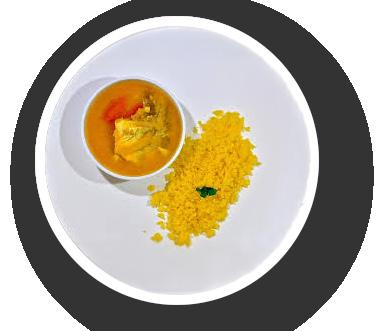
- 2 tablespoons vegetable oil.
- 1 teaspoon chili powder (optional).
- Salt and pepper, to taste.
FOR THE TOMATO SAUCE:
- 3 fresh tomatoes, blended.
- 1 onion, chopped.
- 1 tablespoon tomato paste.
- 2 tablespoons vegetable oil.
- 1 bouillon cube (optional).
- Salt and pepper, to taste.
2. To prepare the attiéké, crumble the attiéké into a large bowl. steam it or microwave for 3 to 5 minutes. Add the chopped onion, diced tomato, vegetable oil, and salt. Mix well and set aside.
3. To prepare the tomato sauce, heat the oil and sauté the chopped onion until translucent. Add the blended tomatoes and tomato paste. Cook over medium heat for about 10 minutes. Season with salt, pepper, and the bouillon cube if desired..

GENERAL DIRECTORATE FOR AFRICA, MIDDLE EAST AND GULF COUNTRIES
CUMANANA XLVII– JULY – 2025
Editorial Board
Ambassador Jorge A. Raffo Carbajal
Minister Marco Antonio Santiváñez Pimentel
Minister Counsellor Eduardo F. Castañeda Garaycochea
Editorial Team
Ambassador Jorge A. Raffo Carbajal, Director General and Editor in Chief
First Secretary Dahila Astorga Arenas, Content Director
Third Secretary Giancarlo Martinez Bravo, English Edition Editor
Third Secretary Berchman A. Ponce Vargas, French and Portuguese Editions Editor
Gerardo Ponce del Mar, Layout Designer
Jr. Lampa 545, Lima, Peru
Teléfono: +51 1 204 2400
Email: peruenafrica@rree.gob.pe
Legal Deposit No. 2025-03899
ISSN: 3084-7583 (online)


